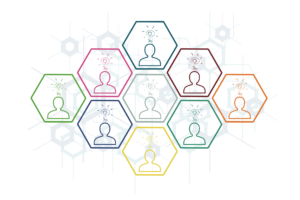Embracing Data Democratization
Many agile and data-driven companies have embraced the concept of data democratization. There are certainly advantages and challenges to this strategic approach. Some in the community recommend having a data governance framework in place before shifting to this strategy, otherwise giving everyone the ability to access data could have a detrimental impact. Data governance includes following regulatory compliance, and emphasizing such bedrock principles as data security, data privacy, and data quality standards.
That’s not to say that the analytics and data science team won’t have a key role in this democratization process, as there should still be continual safeguards and constant monitoring of a company’s data flow and processes. But once systems and training are in place, the data science team can focus on more critical business needs. The big picture is that, “For established businesses, the democratization of data facilitates organizational agility and the ability to make data-driven decisions,” as noted by Claravine in its blog, “Demystifying Data Democratization: Unleash the Power of Big Data for Everyone.”
Data democratization gives the company several solutions to data flow issues. Claravine points out several solutions, for example:
- Information access: Data democratization unlocks access to information previously confined in a data warehouse or data lake and accessible only by IT professionals.
- Resource limitations: Data democratization alleviates pressure on valuable IT resources and frees them from having to fulfill data and reporting requests.
- Data enablement: Data democratization allows organizations to get value from their vast data stores by empowering users to serve as their own data analysts or data scientists.
Data Quality Concerns
In the All Things Insights article, “Data Quality Challenges Raise Questions as Community Eyes Future,” we looked at key results from the H1 2023 Analytics & Data Science Spend & Trends Report. Respondents feel strongly that analytics and data science are becoming more integrated into both corporate and operational decision making. Still, there are some challenges. An interesting challenge to currently explore is that of “data quality.” When asked, “Which are your organization’s top challenges in using data to inform decision-making?,” the majority of respondents (55.9%) said that data quality was the top challenge.
Earlier this year, in “Reinventing the Data Relationship,” All Things Insights spoke with data science strategy executives during the MADS Continued Gathering as they looked to plot a new course for their respective companies. Looking back and looking ahead, these data science experts examined their analytics strategies in the context of the current economic environment.
How Data Democratization Benefits Businesses
Data democratization can benefit an organization in several ways by making data more accessible and usable for a wider range of employees and stakeholders. Here are some key benefits, courtesy of ChatGPT:
- Informed Decision-Making: When data is readily available to employees at all levels of the organization, it empowers them to make informed decisions.
- Increased Innovation: When more people within an organization have access to data, it can spur innovation. Employees from various departments and backgrounds may discover new ways to use data to solve problems, identify opportunities, and create value.
- Efficiency and Productivity: Data democratization can streamline processes. Employees can access the data they need without relying on a centralized data team, reducing bottlenecks and improving efficiency.
- Empowered Employees: Giving employees access to data can make them feel more valued and engaged. They can take ownership of their work and contribute to the organization’s goals with a greater sense of purpose.
- Better Customer Insights: Access to customer data can help frontline employees understand customer preferences, behaviors, and pain points. This can lead to improved customer service, personalized marketing, and enhanced customer experiences.
- Data-Driven Culture: Data democratization can foster a data-driven culture within an organization. When data is readily available, it becomes part of daily discussions, decision-making, and problem-solving, which can lead to a cultural shift toward data-driven thinking.
- Cost Savings: By reducing the reliance on data specialists or analysts to provide insights, organizations can potentially save money on labor costs.
- Compliance and Risk Management: Democratizing data can also help organizations ensure compliance with data privacy and security regulations. When data access and usage are well-documented and monitored, it becomes easier to manage and mitigate risks associated with data handling.
- Faster Response to Market Changes: In a rapidly changing business environment, organizations need to adapt quickly. Access to real-time or near-real-time data allows for faster responses to market changes, trends, and emerging opportunities.
- Competitive Advantage: Organizations that effectively democratize data are often more agile and responsive, which can give them a competitive edge.
The Future of Data for Organizations
Claravine further gives a roadmap to data democratization, which includes such points as securing leadership commitment, taking stock of your data ecosystem, unlocking your legacy data and promoting self-service but providing continued education and training.
It’s important to note that data democratization should be implemented carefully to address privacy, security, and ethical considerations. Organizations should also provide appropriate training and support to ensure that employees can effectively use the data and make responsible decisions based on it. While one can’t predict the future of data science and analytics, optimistically we feel that this would not replace the data scientist, but rather would give them a role of leadership and empowerment within the company.
Video courtesy of Lights On Data
Contributor
-

Matthew Kramer is the Digital Editor for All Things Insights & All Things Innovation. He has over 20 years of experience working in publishing and media companies, on a variety of business-to-business publications, websites and trade shows.
View all posts






































































































































